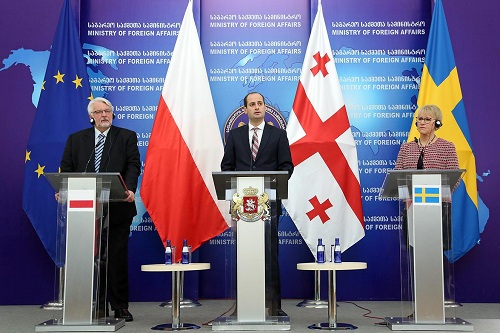
In Tbilisi, Polish and Swedish FMs Reiterate Support for Georgia’s European Aspirations

Polish, Georgian and Swedish Foreign Ministers in Tbilisi, November 14, 2017. Photo: MFA Georgia
On their joint visit to Tbilisi, Foreign Ministers of Poland and Sweden reiterated support to Georgia’s European integration process and the country’s reform efforts.
Witold Waszczykowski of Poland and Margot Wallström of Sweden held talks with Georgian leadership, as well as the civil society representatives in Tbilisi on November 14.
The visit came less than two weeks before the European Union’s Eastern Partnership summit in Brussels, where Tbilisi expects strong messages of support for its European aspirations.
The Foreign Ministers of the two countries, which were behind initiating the Eastern Partnership in 2009, voiced their countries’ political support towards Georgia’s European integration path, but stressed on the need to continue reforms.
Speaking at a joint news conference after meeting with Foreign Minister Mikheil Janelidze, FM Witold Waszczykowski expressed his hope that the EaP Summit declaration would be satisfactory to Georgia, since it “offers the prospect of closer ties with the European Union.”
“Of course, we would prefer to offer you full-fledged EU membership, but, as you know, due to the complicated situation and the fatigue in the European Union, it is not possible right now,” the Minister added. “We keep our fingers crossed for your membership.”
FM Waszczykowski also stressed that the European Union “appreciates” Georgia’s determination and its efforts to reform and make Georgia “a country which is able to enter the European Union.”
The Minister also noted that Poland would “never recognize” the violation of Georgia’s sovereignty and territorial integrity. “You may count on us as a future member of the Security Council of the United Nations.”
In her remarks at the press conference, Minister Margot Wallström reiterated her support for Georgia’s reform efforts and pledged to remain “a firm supporter” of its European aspirations.
“As a progressive member of the Eastern Partnership, Georgia inspires democratic reforms and the fight against corruption in the region,” she noted, but added that the country would need “hard work in years ahead” to fully implement the Association Agreement/DCFTA and to “further strengthen” its institutions.
The Swedish Foreign Minister noted that the two countries “bring high expectations” towards Georgia. “There are areas where we would like to see even more vigorous efforts: the judiciary reform, gender balance in political decision-making, and media freedom.”
FM #Waszczykowski in ����#Georgia: You can count on #Poland as a member of the UN Security Council." #PLUNSC
��https://t.co/mcsUP3ecK8 pic.twitter.com/ykBKaXlNg2
— Poland MFA���� (@PolandMFA) November 14, 2017
Asked whether the wording of the Brussels Summit declaration was disappointing in terms of Tbilisi’s EU membership aspirations, Foreign Minister Mikheil Janelidze said there was “no room for any disappointment.” “Georgia is doing all these reforms for itself and doing it for its own citizens, for its own state and for making Georgia a truly European state.”
Janelidze, however, noted that the country was looking forward to “relevant recognition,” and that he believed “the result will be achieved without disappointment and with hard work.” “Georgia, with its transformation, with its very active dialogue and strategic partnership with the European Union, will achieve the goal of becoming a full-fledged member of the European Union one day.”
As part of their visit to Tbilisi, the two Foreign Ministers met with President Giorgi Margvelashvili and Prime Minister Giorgi Kvirikashvili. They also met with officials from the European Union’s Monitoring Mission in Georgia and accompanied a patrol by the mission to the occupation line near village Odzisi.